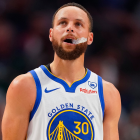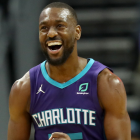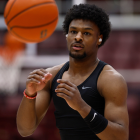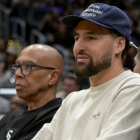Some thought the Portland Trail Blazers would be one of the very worst teams in the NBA last season. Few predicted they would win more than 40 games and make the playoffs. No one thought they would advance to the second round. For all the hand-wringing about the league being predictable, there's a team or two like this every year. Here are seven to watch for next season:
 Utah Jazz
Utah Jazz
Why they'll be better: The Jazz should have been a playoff team last year, but injuries and poor point guard play kept them (barely) out. Now, not only are they likely to be healthier, they are more equipped to handle injuries if they do occur. CBS Sports' NBA writers collectively ranked Utah's starting lineup fifth in the league and ranked its bench first.
This team should be a powerhouse. Most opponents will not have the big men to deal with a frontcourt duo like Derrick Favors and Rudy Gobert. Most will not have two top-notch perimeter defenders to match up with Gordon Hayward and Rodney Hood, either. George Hill is the perfect low-maintenance, defense-first, floor-spacing point guard for this group, and Utah's bench depth means that few teams will be as versatile on both ends. Imagine if Dante Exum has a breakout season.
After four years of missing the playoffs and drafting wisely, the front office decided that it is winning time. With Hill, Joe Johnson and Boris Diaw in the fold, inexperience will not be an excuse.
What could go wrong: Honestly? Nothing, really, outside of the normal concerns about health. My biggest qualm with the Jazz under Quin Snyder is that they have a tendency to over-pass, and that's not a big deal.
 Minnesota Timberwolves
Minnesota Timberwolves
Why they'll be better: Their most important players are 21 years old and younger. Even if the Timberwolves made no changes to the coaching staff or roster this summer, you could expect Karl-Anthony Towns, Andrew Wiggins and Zach LaVine to develop. All three of them were much better at the end of last season than they were at the beginning. Outside of the cast of Stranger Things, you'd be hard-pressed to find an equally impressive collection of young talent.
As well as the individual players' improvement, the Wolves collectively showed signs of figuring stuff out late in the year. That's when they started shooting 3-pointers more regularly and upsetting teams like the Warriors and Thunder. Now, if they could just play a little bit of defense, they might be able to compete with upper-echelon teams all the time.
And that's where Tom Thibodeau comes in. Minnesota now has the most respected defensive mind in all of basketball running the show. This seems perfect.
What could go wrong: Unlike the Jazz, the Wolves do not have great depth or experience. It's not clear whether or not Kevin Garnett will be back, and he was important as a leader and a teacher. They could struggle with spacing, especially if they don't get more out of Nemanja Bjelica. It could take Towns a couple more years to become a true defensive anchor, and the team as a whole could take a while to adjust to Thibodeau.
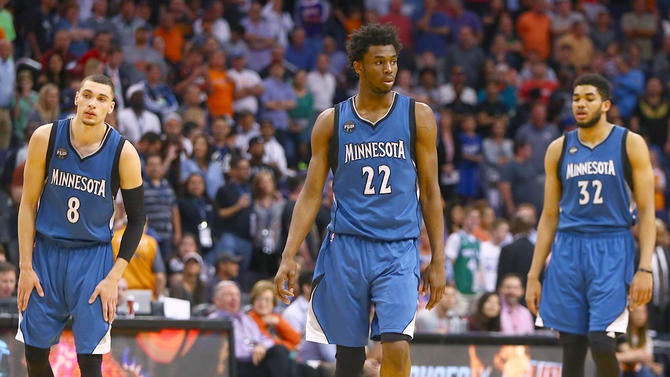
 Milwaukee Bucks
Milwaukee Bucks
Why they'll be better: Like the Wolves, the Bucks' core players should keep growing. Giannis Antetokounmpo and Jabari Parker are both 21 years old and have shown glimpses of stardom. It sounds like Milwaukee is committed to using Antetokounmpo as its primary ballhandler, and he has the potential to be special in that role. It's still weird that Milwaukee struggled so much on defense last year -- with all that length, it should have been better.
A lot of the Bucks' offensive problems would be alleviated if Antetokounmpo and Parker were 3-point threats. Shooting was Milwaukee's biggest weakness, and the front office addressed it by adding Matthew Dellavedova and Mirza Teletovic in the offseason. They are role players, but they could dramatically change the way the team's offense operates. This is a good thing.
What could go wrong: Well, one thing that went wrong last year was the Greg Monroe signing. As CBS Sports' Matt Moore explained, Monroe hurt the Bucks' defense and didn't help them as much as they hoped on the other end. This might simply be a bad fit, and it's unclear if Milwaukee will be able to salvage this situation or trade him.
It still feels like the Bucks are an experiment. The trio of Antetokounmpo, Parker and Khris Middleton is theoretically dangerous, but they still have to prove that it can work.
 Denver Nuggets
Denver Nuggets
Why they'll be better: Reliable combo forward Wilson Chandler missed all of last season and promising big man Jusuf Nurkic missed most of it. If they're healthy and just one of the Nuggets' three rookies -- Jamal Murray, Malik Beasley and Juan Hernangomez -- is ready to play, they will be one of the deepest teams around.
The two players to watch here are last year's rookies. Nikola Jokic is probably your new favorite player, and Emmanuel Mudiay fits the profile of a point guard who could make big strides in his second season. If Mudiay cuts down on his turnovers and figures out how to finish around the rim, then he'll be a totally different player.
What could go wrong: Denver finished 24th in defensive rating last year, and it is relying mostly on internal improvement fixing that. This seems risky.
Also, there might not be enough minutes for everybody in the frontcourt. The way the league has changed, Chandler and Danilo Gallinari would probably both be best at power forward. It's hard to know if they'll see any minutes there, however, with Jokic, Nurkic, Kenneth Faried, Darrell Arthur, Joffrey Lauvergne and Hernangomez on the roster. This is a good problem to have, but it's still a problem.
 New Orleans Pelicans
New Orleans Pelicans
Why they'll be better: It seemed like the Pelicans were cursed last year. They started Nate Robinson and Kendrick Perkins on opening night, and things only got marginally better from there. Let's remember everybody was so optimistic before all the injuries -- Anthony Davis is one of the best players in the world, and there are competent role players around him.
New Orleans didn't have an exciting offseason. Ryan Anderson and Eric Gordon went elsewhere, and the newcomers, Buddy Hield aside, are not exactly household names. The Pelicans needed someone like Solomon Hill to play perimeter defense, though, and both E'Twaun Moore and Langston Galloway should fit in just fine in the backcourt.
What could go wrong: The idea last year was to push the pace and improve defensively at the same time. It's unclear if that is possible with this roster, and the big question here is how Omer Asik fits into that. He was once one of the best defensive centers in the league, and you would expect he and Davis to work well together on that end. This was not the case last season.
Jrue Holiday's health is always a concern, too, and it's unclear where Tyreke Evans fits on this team now. Evans is not expected to be ready for the start of the season because of knee trouble.
 Phoenix Suns
Phoenix Suns
Why they'll be better: Eric Bledsoe and Brandon Knight hardly got to play together last year. With Devin Booker's emergence, Phoenix has an extremely dangerous guard rotation, especially on offense. If the Suns start Jared Dudley and P.J. Tucker at the forward spots, they'll space the floor nicely for the playmakers and bring versatility on defense.
Like New Orleans, Phoenix shouldn't have been as bad as it was last year. Injuries and chemistry issues derailed everything. With Dudley and Leandro Barbosa both coming back in free agency, the hope is that the locker room will be more harmonious this time around. Making the playoffs is far from guaranteed, but that should be the goal.
What could go wrong: Bledsoe, Knight and Booker might not figure out how to share the ball. Centers Tyson Chandler and Alex Len could wind up playing too many minutes together. There aren't a ton of proven defenders here. Coach Earl Watson needs to make this team click in a way that it hasn't for a few years.
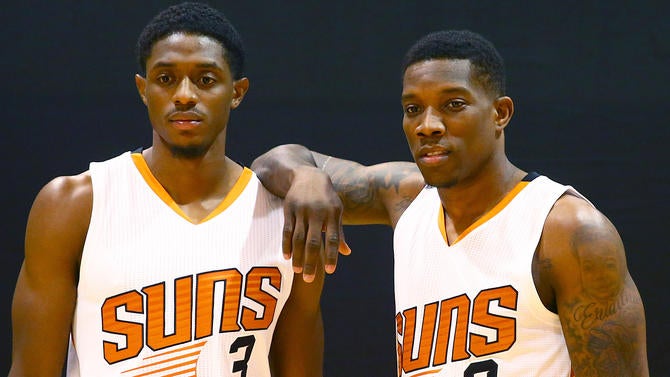
 Orlando Magic
Orlando Magic
Why they'll be better: Frank Vogel's teams tend to overachieve and it's going to be extremely difficult to score against this team. Serge Ibaka is theoretically the perfect defender to cover up Nikola Vucevic's flaws, and having Bismack Biyombo on the bench is a luxury. If the Magic fully commit to being a tough, defense-first team, then it will have an identity for the first time in the post-Dwight era.
Even with Victor Oladipo gone, Orlando has no shortage of young players with room to grow. Aaron Gordon is 20, Mario Hezonja is 21, Elfrid Payton is 22 and Evan Fournier is 23. It'll be a challenge for Vogel to make all of these pieces fit together quickly, but there is a lot of potential.
What could go wrong: In a word: offense. Payton badly needs to improve his jump shot, and Gordon might not be ready to play small forward. The Magic still don't have enough shooting or passing, and it's still weird that they let Tobias Harris go for essentially nothing.










